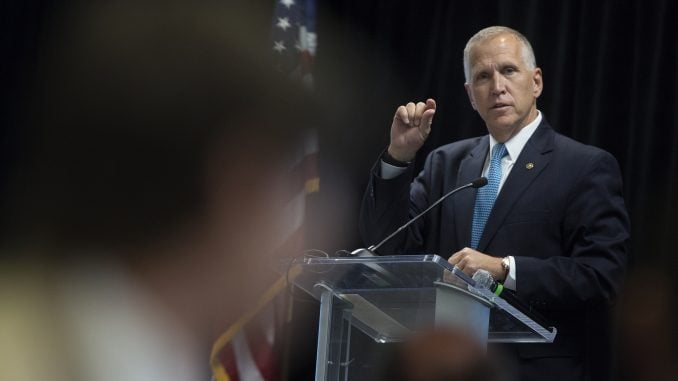
WASHINGTON, D.C. — President Donald Trump on Tuesday scrapped a five-year-old program that allows 800,000 people illegally in the U.S. to stay without threat of deportation. Deferred Action for Childhood Arrivals (DACA), enacted by executive order from former President Barack Obama, allowed those brought illegally into the U.S. as children to remain. Trump’s new plan phases out DACA, delaying implementation until March and giving Congress six months to come up with an alternative.
The action was announced by Attorney General Jeff Sessions, who called DACA an unconstitutional overreach by Obama. There will be an “orderly, lawful wind down,” Sessions said in a press conference Tuesday.
Trump later issued a written statement saying, “I do not favor punishing children, most of whom are now adults, for the actions of their parents. But we must also recognize that we are nation of opportunity because we are a nation of laws.”
The administration said nobody covered by the program, which provided work permits in addition to deportation protection, would be affected before March 5. Most of the people covered by DACA are in their 20s.
By deferring the actual end of the program, Trump effectively kicked responsibility for the fate of those covered by DACA to his fellow Republicans who control Congress. But neither Trump nor Sessions offered details of the type of legislation they would want to see, and Trump’s spokeswoman offered only a broad outline.
Sen. Thom Tillis (R-N.C.) announced Tuesday that he will file legislation soon that could provide a way for some DACA recipients to stay legally.
“In the next week, I’ll be introducing legislation that will provide a fair and rigorous path for undocumented children to earn legal status by requiring them to be employed, pursue higher education, or serve in our Armed Forces,” said Tillis in a statement. “I know this kind of common-sense legislative fix can and should unite members of Congress, and I’ll be working closely with my colleagues on the path forward. It’s up to my Democratic colleagues to decide whether they want a permanent solution or to make this a political wedge issue. I hope they’ll choose bipartisanship.”
The Trump administration’s announcement came on the deadline set by a group of states, led by Texas, who said they would file legal challenges in federal court if Trump did not act to end DACA.
Now, the Democratic attorney general of Massachusetts, Maura Healey, said a coalition of states planned to file suit in the coming days to defend DACA. The American Civil Liberties Union is also among advocacy groups considering legal action.
“In North Carolina, tens of thousands of our friends and neighbors have used DACA to contribute to the economy, get an education, and invest in the only home they know,” said Irena Como, staff attorney for the ACLU of North Carolina. “Today the federal government has turned its back on these young people who came out of the shadows and worked hard to build their lives here.”
The DACA recipients are a fraction of the roughly 11 million illegal immigrants in the United States, most of whom are Hispanic. Supporters of the program argue that people covered by it were raised and educated here and integrated into society, with scant ties to their countries of origin. Opponents of the program say that it is against federal law and gives incentive for further illegal immigration.
“To have a lawful system of immigration that serves the national interest, we cannot admit everyone who would like to come here,” said Sessions. “It’s just that simple. That would be an open-border policy and the American people have rightly rejected that.”
DACA recipients whose work permits expire will be in the country and eligible for deportation, but will be a low priority for immigration enforcement, administration officials said.
“The Obama-era program went far beyond the executive branch’s legitimate authority,” said Senate Leader Mitch McConnell (R-Ky.). “President Obama unilaterally conferred lawful presence and work authorization, and then President Obama used that lawful-presence dispensation to unilaterally confer U.S. citizenship.”
According to Department of Homeland Security officials, nearly 202,000 DACA recipients’ work permits have expired or will expire between August and December, and more than 275,000 will expire in 2018.


